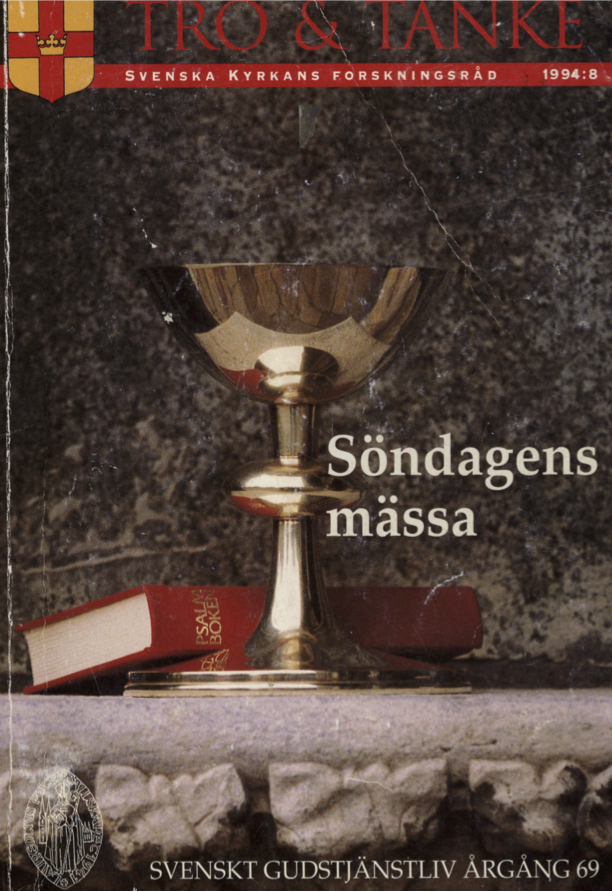Söndaglig mässa - några internationella ekumeniska utblickar
Abstract
At the beginning of modern ecumenical theological dialogues the idea of unity based on dogmatic consensus was predominant. After the Second World War this position was supplemented by a growing insight of the importance of the role of spirituality and liturgical life for unity among the churches. Consequently, sacramental praxis gained weight in the faith and order dialogues, not least under the influence of the liturgical movement.
From the Faith and Order World Conference in Montreal 1963 the question of "frequent celebration of the Holy Communion", especially on Sundays, has been on the agenda of the Faith and Order Commission and been an integrated part of several studies on the Eucharist. Since the meeting of the Commission in Louvain in 1971, the theme of "intercommunion" has been widened to include also common eucharistic practices, paving the way for common eucharistic fellowship among the churches. Celebration of the Eucharist every Sunday and frequent communion by the believers should be a sign of convergence. The recommendation frequently to celebrate Holy Communion, and at least each Sunday, was re peated at the General Assembly of the World Council of Churches in Uppsala, 1968.
The Lima Document, Baptism, Eucharist and Ministry (1982), recommends eucharistic celebration each Sunday and states that differences in practice, liturgy and theology are rooted in various customs. The underlying idea is that the local churches, by celebrating the Sunday Eucharist, relate to other churches and thereby to the Church Catholic. The local church does not celebrate Mass in isolation hut as a part or manifestation of the Church of Christ.
Commenting on the Lima Document, the General Assembly of the Lutheran World Federation (LWF) in Budapest, 1984, consents with the idea of Sunday Mass. This is also in accordance with various previous statements from the LWF.
The situation among churches in Lutheran-Melanchthonian traditions vary on the matter of the frequency of Sunday Eucharist. In the Re formation period, Sunday Mass (with Word and Sacrament) was essential in church life. The demand for communicants each Mass and a reduction of motifs in the eucharistic theology became, however, disastrous and in the long run the main Sunday worship was ordinarily celebrated without the Eucharist.
Influenced by biblical, patristic, liturgical and ecumenical scholarship this reductionism has changed into a growing acceptance of a great variety of eucharistic motifs. In church life, this has led to an increasing importance of the Eucharist, reflected in ecumenical dialogues in which Lutheran theologians have taken part, e.g. the Anglican-Lutheran dialogue 1972 (the Pullach-Report). This applies also to the Lutheran/Roman Catholic international dialogue (Das Herrenmahl, 1974, Einheit vor uns, 1984) in which the recommendations to the Lutherans to celebrate the Sunday Mass is of importance.
If, in the Faith and Order movement as well as in the bilaterals, there is an agreement on the necessity of Holy Communion each Sunday, it is being questioned in the Roman-Catholic/Evangelical-Lutheran Dialogue in Germany. This is due to the connection between frequent communion and the celebration of the Sunday Mass made in the previously-mentioned statements. Communion each Sunday seems, according to German dialogue, not to be necessarily in accordance with traditional Lutheran and Roman Catholic veneration of the eucharist. The intimate connection between communion and the celebration of the Eucharist every Sun day in the faith and order ecumenism (in its broadest sense) made the Germans refrain from recommendations.
The reasons for the above-mentioned connection seem to be that it gives the possibility to address not only churches practising infrequent Sunday communion but also churches practising the Sunday Mass although with many non-communicants taking part in the Mass. Appended to the Reformed-Lutheran dialogue in the USA, there is a Lutheran statement dealing with the above-mentioned connection clarifying the problem why frequency of communion and frequency of celebration should not be confused. The Church, on the one hand, must make the sacrament available but the partaking of the Holy Communion is a personal matter.
The motifs, mentioned above, which underline the importance of the Sunday Mass, are referred to in accordance with Geoffrey Wainwright’s substantial and concise resumé in the Dictionary of the Ecumenical Movement, 1991.
Downloads
Publicerad
Nummer
Sektion
Licens
© författarna, Laurentius Petri Sällskapet för svenskt gudstjänstliv samt Artos & Norma bokförlag. Det är tillåtet att kopiera och använda material ur Svenskt Gudstjänstliv för forskningsändamål om källan anges. För övriga ändamål kontakta respektive artikelförfattare samt förlaget. Särskilda restriktioner kan gälla för bildmaterial.


